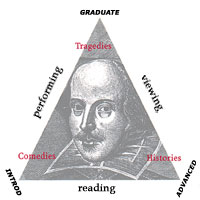Comedies
As You Like It lecture 10/94

AYLI: Title suggests lightness; music and dance; fairy tale quality making history and farce remote. Lots of wit; not much plot; lots of set pieces.
About love and youth and nature as beautiful and healing--escapist; other world
Sing the song; It was a lover and his lass...
Springtime not October. Celebration of innocence; Arden; Eden; the penalty of Adam and Eve; world of pleasure and liberty
Comic plot: terrible problem in family and state--escape to a world outside where the rules dont apply--readjustment and return. i.e. socialization and turnover
Bringing in the May festivity; Festive Carnival pattern--not farce, but pastoral.
Relation to age, especially adolescence--"youth"--passage from youth to adulthood problematic in all ways; status, identity, role change. [Seen also in HV and in Shrew]
Rites of passage--Van Gennep: separation, transition [=courtship], reintegration=marriage as part of age/ maturation process. Jaques' speech; metatheatrical aspect as well. Plays emphasis on age--Pastoral world as where old and young hang out--outsiders
College--groves of Academe; the Farm; SLOtown; campus=fields="camp"
Pastoral gives another perspective--escape and deliverance and satirical critique. Hippies, Back to the Land, the Goodlife, Utopia, Woodstock nation, granola heads. Pastoral is Nature vs. Artificial; revolt against the conventional unnatural--e.g. primogeniture; the Duke's speech--
This is another aspect--the pastoral of old age--Corin--82-83--the wisdom of experience.
Celebration of Pastoral itself an artifice; though it celebrates simplicity--back to the Greeks; Theocritus and Vergil. A real impulse--the pilgrims, America; and a pose. Very popular during the Renaissance and later, especially among nobility; Elizabeth as Shepherd; Marie Antoinette and the petit Trianon--quotation of Christopher Marlowe
Another element--pastoral as debate and critique and balance as well as idealization-shepherd debates. Marlowe Ralegh Debate--Touchstone p. 81.
Issue of love--idealization: Orlando's poems, written in bark p.85-- and Rosalind and Celia's putdown.
Rosalind's head over heels and yet a mocker--love as an ideal of innocence like pastoral--an imagined reality--most false and true.
The four couples who marry; the nature of love
The real historical elements as well : Class and pastoral; younger brothers; men and women
Melancholy vs. Roz moderation--modern censure; drunkards
--individualistic melancholy--malcontent; beat; poetry; existential
Traveller; experience--humorous sadness--the comedy of insight and social critique; not dancing measures--merry vs sad--her put-downs of his pretensions and complaints; Duke loves him; he loves Touchstone
Contrast to happiness--does love provide happiness?
Love test--what's real--cf. Silvius and Corin--p. 66
Teaser--wealth; horns--Woo me, holiday mood--unpredictability--flirting--serious or not?
Wish fulfillment: as if
Kissing and speaking--is kiss passionate or stalling tactic--her cynicism-
Her acting at "Nay"--inner struggle; where is Roz and where Ganymede--love and death--lawyers talk; using substitution; wit of "men have died..." Life's a play--Jaques' wit
Orlando exaggerated idealism--Lucentio; also Silvius;
Now she'll be more receptive--yes...and no--Roz and Ganymede
False marriage--are these vows and is this incident serious or trivial--cf. Shrew; cf. courtship of Henry and Kate; she is serious about going through with it.
How long? Time--now vs. forever--girls and wives; suitors and husbands
The wiser the waywarder--her testing him and disabusing him. Compare to Kate
Adultery and deception and woman's wit; sexual freedom and equality;
Orlando splits--he has alliance with the Duke her father--HV and Shrew-- she wants to control and manipulate him--Time is the old justice
Celia's anger and delight
Roz's passion; how deep
Next scene: the deer, the hunt, male bonding and female bonding vs. marriage.
Compare relationships in the final scene
Androgyny of Ganymede
Ending: the tragic elements here to be taken up in Lear: family strife; sibling rivalry; intergenerational conflict; exile and abandonment; survival and poverty; class and gender; divinity
Redemptive: human solidarity in exposure
Read from Youth vs. Age.
| TOP |